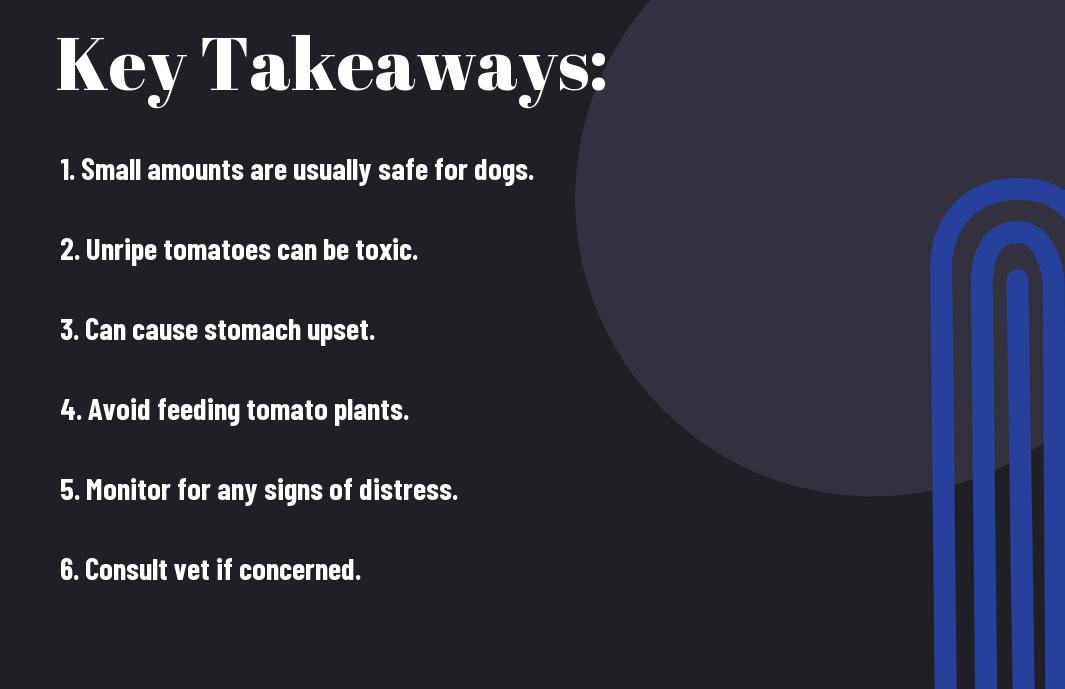You may be wondering, can a little tomato be bad for your pup, too? Let’s explore into this juicy topic and find out if a small amount of tomato can hurt your furry friend. While tomatoes are safe for dogs to consume in small quantities, it’s necessary to know about certain parts of the tomato plant that can be harmful. Read on to learn how to safely incorporate tomatoes into your dog’s diet and keep their tails wagging!
Key Takeaways:
- Tomatoes can be toxic to dogs: While ripe tomatoes are generally safe for dogs in small amounts, green tomatoes, tomato plants, and unripe tomatoes can be harmful due to solanine content.
- Monitor your dog for symptoms: If your dog eats tomatoes and exhibits symptoms like lethargy, stomach upset, or weakness, contact your vet immediately.
- Consult your vet: Before including tomatoes in your dog’s diet, it’s best to consult your vet to ensure they are safe and suitable for your furry friend.
The Tomato Conundrum
What’s in a Tomato?
Tomatoes are a common household ingredient found in many dishes. They contain tomatine and solanine, which are both toxic to dogs. These compounds are part of the plant’s natural defense system, designed to ward off insects and other pests.
Why Are Tomatoes a Concern for Dogs?
Dogs lack the digestive enzymes needed to properly break down tomatine and solanine. When ingested in large amounts, these substances can be harmful and even lead to symptoms such as gastrointestinal upset, weakness, and confusion in your furry friend.
Tomatoes that are unripe or still attached to the vine contain higher levels of tomatine and solanine, making them more toxic. It’s imperative to keep a close eye on your dog around tomato plants in your garden to prevent any accidental ingestion.
The Toxic Truth
There’s a common misconception that all parts of the tomato plant are safe for your furry friend. However, tomatoes belong to the nightshade family, which contains a toxic substance called solanine that can be harmful to dogs.
Solanine: The Culprit Behind Tomato Toxicity
The solanine in tomatoes can cause gastrointestinal issues such as stomach pain, diarrhea, and vomiting in dogs. In severe cases, it can even lead to lethargy, weakness, and confusion. It’s imperative to be cautious about feeding your dog tomatoes and monitor their reaction closely.
How Much Solanine is Too Much?
Much like with any toxic substance, the amount of solanine present in the tomato determines its level of danger to your dog. While a small amount of ripe tomato may not cause harm, ingesting large quantities of unripe tomatoes or other parts of the plant like the leaves and stems can lead to toxicity.
Understanding the signs of solanine poisoning is crucial for protecting your furry friend. If you suspect that your dog has consumed a toxic amount of tomato, contact your veterinarian immediately for guidance and treatment.
Canine Consumption Concerns
What Happens if My Dog Eats a Small Amount of Tomato?
After your dog has consumed a small amount of tomato, you may be wondering what to expect. In general, tomatoes are not toxic to dogs in small quantities. However, they can cause some digestive issues such as stomach upset or diarrhea. If your dog has only ingested a small amount of tomato, chances are they will be just fine.
Symptoms of Tomato Toxicity in Dogs
To address your concerns about tomato toxicity in dogs, it’s important to know the potential symptoms to watch out for. If your dog has consumed a large amount of tomato or green tomatoes, symptoms of toxicity may include gastrointestinal upset, lethargy, weakness, confusion, and even more severe symptoms in rare cases. It’s crucial to monitor your dog closely and contact your vet if you notice any concerning symptoms.
Small amounts of ripe, red tomatoes are generally safe for dogs to consume. However, you should still exercise caution and prevent your dog from ingesting large quantities or any green parts of the plant. If you suspect your dog has eaten an excessive amount of tomato or exhibit any worrying symptoms, it’s best to consult your veterinarian for guidance and assistance.
Factors Affecting Toxicity
Keep in mind that several factors can affect the level of toxicity of tomatoes for your dog. Understanding these factors can help you make informed decisions about feeding tomatoes to your furry friend.
Ripeness Matters: Green vs. Ripe Tomatoes
One factor that can impact the toxicity of tomatoes for your dog is ripeness. Green, unripe tomatoes contain higher levels of solanine, a toxic compound that can be harmful to your pet. On the other hand, ripe tomatoes have lower solanine levels and are generally safer for dogs to consume. If you choose to feed your dog tomatoes, opt for ripe ones to reduce the risk of toxicity.
Cooking and Processing: Does it Make a Difference?
An important consideration when it comes to feeding tomatoes to your dog is how they are prepared. Cooking or processing tomatoes can help break down certain compounds, making them easier for your dog to digest. However, some preparations, such as adding seasoning or sauces, can introduce other ingredients that may be harmful to your pet. It’s necessary to be mindful of how tomatoes are cooked or processed before feeding them to your dog.
The way tomatoes are cooked or processed can affect their toxicity levels for dogs. For example, tomato sauces or soups that contain other ingredients like onions or garlic can be potentially harmful to your pet. If you choose to feed your dog tomatoes, opt for plain, cooked tomatoes without any added seasonings or ingredients to minimize the risk of toxicity.
Any seasoned pet owner knows that it’s crucial to consider these factors when determining if a small amount of tomato will hurt your four-legged friend.
Prevention and Precautions
Keeping Tomatoes Out of Reach
On your quest to keep your furry friend safe, make sure to store tomatoes in a secure place that your dog can’t access. Whether it’s on the kitchen counter, in the fridge, or in a locked pantry, taking this simple step can prevent your dog from accidentally ingesting tomatoes.
Safe Alternatives for Your Furry Friend
Safe alternatives such as carrots, cucumbers, or bell peppers can be a tasty and healthy option for your dog to enjoy instead of tomatoes. These crunchy snacks are not only safe but also provide important nutrients for your pup’s well-being.
Furry friends deserve yummy treats too! Consider stocking up on dog-friendly fruits like apples or blueberries to satisfy your pup’s cravings without risking any potential harm from tomatoes.
Treatment and Intervention
What to Do if Your Dog Ingests Tomato
To address the situation where your dog ingests tomato, ensure you monitor them closely for any signs of discomfort or distress. If your dog consumed a small amount of tomato, keep an eye out for symptoms such as vomiting, diarrhea, or lethargy. It is recommended to provide plenty of water to help dilute the effects of the tomato on your furry friend’s system. In most cases, these mild symptoms will pass on their own, and your dog should be back to their usual self soon.
When to Seek Veterinary Attention
Regarding deciding whether to seek veterinary attention after your dog ingests tomato, there are a few key signs to watch out for. If your dog shows persistent vomiting, diarrhea, abdominal pain, or any signs of dehydration, it is necessary to contact your veterinarian right away. Additionally, if your dog ingested a large amount of tomato or if they have any preexisting health conditions, it’s best to err on the side of caution and seek professional help. Your veterinarian can provide the necessary treatment and guidance to ensure your dog’s well-being.
Understanding when it’s appropriate to seek veterinary attention can help prevent any potential complications from your dog ingesting tomato. Bear in mind, it’s always better to be safe than sorry when it comes to your furry companion’s health!
Conclusion
To wrap up, it’s important to remember that while tomatoes are safe for dogs in small amounts, it’s always best to monitor your furry friend after they have consumed any new food. Note, moderation is key, and always consult your veterinarian if you have any concerns about your dog’s diet. So, rest assured, a small amount of tomato is unlikely to hurt your dog, but it’s always best to err on the side of caution when it comes to your pet’s health and well-being.
FAQ
Q: Can my dog eat tomatoes?
A: Dogs can safely eat ripe tomatoes in moderation, but certain parts of the tomato plant are toxic to dogs. It’s best to stick to ripe tomatoes and avoid stems and leaves.
Q: What happens if my dog eats a small amount of tomato?
A: A small amount of ripe tomato is unlikely to harm your dog, but ingestion of large amounts or unripened tomatoes can lead to gastrointestinal issues such as upset stomach or diarrhea.
Q: Are there any benefits to feeding my dog tomatoes?
A: Tomatoes contain vitamins A, C, and K, as well as lycopene, which can provide some health benefits for dogs when fed in moderation. However, it’s important not to overfeed tomatoes due to their acidic nature.
Q: How should I prepare tomatoes for my dog?
A: When feeding your dog tomatoes, make sure to remove the stem, leaves, and any green parts, as they can be toxic. It’s best to chop the tomato into small, bite-sized pieces to prevent choking hazards.
Q: What are some signs of tomato poisoning in dogs?
A: If your dog consumes a large amount of unripened tomatoes or parts of the tomato plant, watch out for symptoms such as vomiting, diarrhea, lethargy, confusion, weakness, or dilated pupils. If you notice any of these signs, contact your veterinarian immediately.
Are strawberries toxic for dogs
Your Dog’s Allergies: Expert Advice
Demystifying Anal Gland Issues in Dogs: Your Comprehensive Guide from the American Kennel Club




